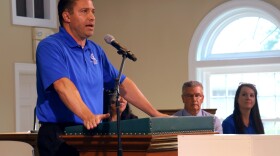Union leaders responded Monday morning to Mayor Greg Fischer’s request that workers agree to a pay freeze in the next fiscal year, as Louisville tries to figure out how to plug a $35 million budget hole.
They said the requested “true zero” wage increase is unacceptable, but they don’t blame the mayor for asking.
The union leaders instead placed blame on the Metro Council members who voted against a tax increase last month that would have helped offset the shortfall that the administration says is driven by rising employee health care and pension costs. That decision leaves the city to find savings in its next budget. This year’s general fund is $626 million.
Tracy Dotson, president of FOP Corrections Lodge 77, called out Council members who he said went on vacation or made “flippant” comments on social media and TV following the vote.
“You better come up with [a plan], you better have that magic bullet ready to go if you voted no on that tax plan rather than cut our jobs, freeze our wages and lay our members off,” Dotson said.
Last week, members of Fischer’s administration contacted union leaders to ask if their members would consider forgoing cost of living increases in order to avoid layoffs. Representatives of eight public sector unions said they had not accepted the proposal.
They gathered in a small park outside Metro Hall — where the mayor’s office is housed — with Metro Council’s headquarters, City Hall, behind them.
Todd Dunn, president of the Greater Louisville Central Labor Council, said the proposed wage freeze essentially “asks Louisville Metro employees to pay for their own jobs.” The GLCLC represents about 4,000 public sector workers, he said. He also pointed out that the measure would not come close to filling the $35 million budget hole.
On Friday, Fischer said the proposed wage freeze and other measures would save the city less than $5 million.
“If you're asking me what I think the mayor's position of it is, I think he's doing the best job he knows how,” Dunn said.
The mayor is also asking all city leadership to come together to find a comprehensive solution, Dunn added. That includes Metro Council members.
Ahead of the meeting, Fischer released a statement by email, in which he said 70 percent of the city’s budget is for personnel. He said it would be “impossible” to balance the budget without affecting workers.
“But let me be clear: I hate the idea of asking these men and women to give up their COLAs, just as I hate the other cuts we’ll need to make. That’s why I proposed new revenue. I will continue to work with these valued employees to see how we can implement the Council’s cuts with as little pain to them and our residents as possible,” he wrote.
Fischer will present a shrunken budget proposal to Metro Council on April 25. The body will have two months to work on and pass a budget before the next fiscal year starts, on July 1.






